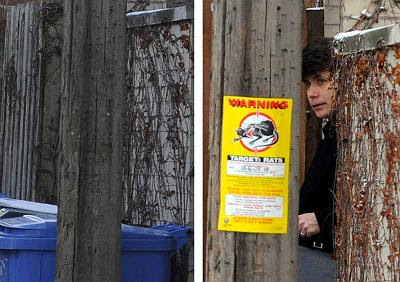
A building sits on its own island of land in Chongqing Municipality, China. The homeowner has refused to sell to a developer, who went ahead with construction around the site.
By HOWARD W. FRENCH
Published: March 27, 2007
CHONGQING, China, March 23 — For weeks the confrontation drew attention from people all across China, as a simple homeowner stared down the forces of large-scale redevelopment that are sweeping this country, blocking the preparation of a gigantic construction site by an act of sheer will.
Chinese bloggers were the first to spread the news, of a house perched atop a tall, thimble-shaped piece of land like Mont-Saint-Michel in northern France, in the middle of a vast excavation.
Newspapers dived in next, followed by national television. Then, in a way that is common in China whenever an event begins to take on hints of political overtones, the story virtually disappeared from the news media after the government, bloggers here said, decreed that the subject was suddenly out of bounds.
Still, the “nail house,” as many here have called it because of the homeowner’s tenacity, like a nail that cannot be pulled out, remains the most popular current topic among bloggers in China.
It has a universal resonance in a country where rich developers are seen to be in cahoots with politicians and where both enjoy unchallenged sway. Each year, China is roiled by tens of thousands of riots and demonstrations, and few issues pack as much emotional force as the discontent of people who are suddenly uprooted, told that they must make way for a new skyscraper or golf course or industrial zone.
What drove interest in the Chongqing case was the uncanny ability of the homeowner to hold out for so long. Stories are legion in Chinese cities of the arrest or even beating of people who protest too vigorously against their eviction and relocation. In one often-heard twist, holdouts are summoned to the local police station and return home only to find their house already demolished. How did this owner, a woman no less, manage? Millions wondered.
Part of the answer, which on meeting her takes only a moment to discover, is that Wu Ping is anything but an ordinary woman. With her dramatic lock of hair precisely combed and pinned in the back, a form-flattering bright red coat, high cheekbones and wide, excited eyes, the tall, 49-year-old restaurant entrepreneur knows how to attract attention — a potent weapon in China’s new media age, in which people try to use public opinion and appeals to the national image to influence the authorities.
“For over two years they haven’t allowed me access to my property,” said Ms. Wu, her arms flailing as she led a brisk walk through the Yangjiaping neighborhood here. It is an area in the throes of large-scale redevelopment, with broad avenues, big shopping malls and a recently built elevated monorail line, from whose platform nearly everyone stops to gawk at the nail house.
Within moments of her arrival at the locked gate of the excavated construction site, a crowd began to gather. The people, many of them workers with sunken cheeks, dressed in grimy clothes, regarded Ms. Wu with expressions of wonderment. Some of them exchanged stories about how they had been forced to relocate and soothed each other with comments about how it all could not be helped.
From inside the gates a government television crew began filming.
“If it were an ordinary person they would have hired thugs and beat her up,” murmured a woman dressed in a green sweater who was drawn by the throng. “Ordinary people don’t dare fight with the developers. They’re too strong.”
Earlier this month the National People’s Congress passed a historic law guaranteeing private property rights to China’s swelling ranks of urban middle-class homeowners, among others. Some here attributed Ms. Wu’s success to that, as well as her knack for generating publicity.
“In the past they would have just knocked it down,” said an 80-year-old woman who said she used to be a neighbor of Ms. Wu’s. “Now that’s forbidden, because Beijing has put out the word that these things should be done in a reasonable way.”
Between frenzied telephone calls to reporters and city officials, Ms. Wu, who stood at the center of the crowd with her brother, a 6-foot-3 decorative stone dealer who wore his brown hair in jheri curls, stated her case with a slightly different spin.
“I have more faith than others,” she began. “I believe that this is my legal property, and if I cannot protect my own rights, it makes a mockery of the property law just passed. In a democratic and lawful society a person has the legal right to manage one’s own property.”
Tian Yihang, a local college student, spoke glowingly of her in an interview at the monorail station. “This is a peculiar situation,” he said, with a bit of understatement. “I admire the owner for being so persistent in her principles. In China such things shock the common mind.”
Ms. Wu will in all likelihood lose her battle. Indeed, developers recently filed administrative motions to allow them to demolish her lonely building. Certainly the local authorities are eager to see the last of her.
“During the process of demolition, 280 households were all satisfied with their compensation and moved,” said Ren Zhongping, a city housing official. “Wu was the only one we had to dismantle forcibly. She has the value of her house in her heart, but what she has in mind is not practical. It’s far beyond the standards of compensation decided by owners of housing and the professional appraisal organ.”
With the street so choked with onlookers that traffic began to back up, Ms. Wu’s brother, Wu Jian, began waving a newspaper above the crowd, pointing to pictures of Ms. Wu’s husband, a local martial arts champion, who was scheduled to appear in a highly publicized tournament that evening. “He’s going into our building and will plant a flag there,” Mr. Wu announced.
Moments later, as the crowd began to thin, a Chinese flag appeared on the roof with a hand-painted banner that read: “A citizen’s legal property is not to be encroached on.”
Asked how his brother-in-law had managed to get inside the locked site and climb the escarpment on which the house is perched, he said with a wink, “Magic.”
Copyright 2007 The New York Times Company {GSSC}














